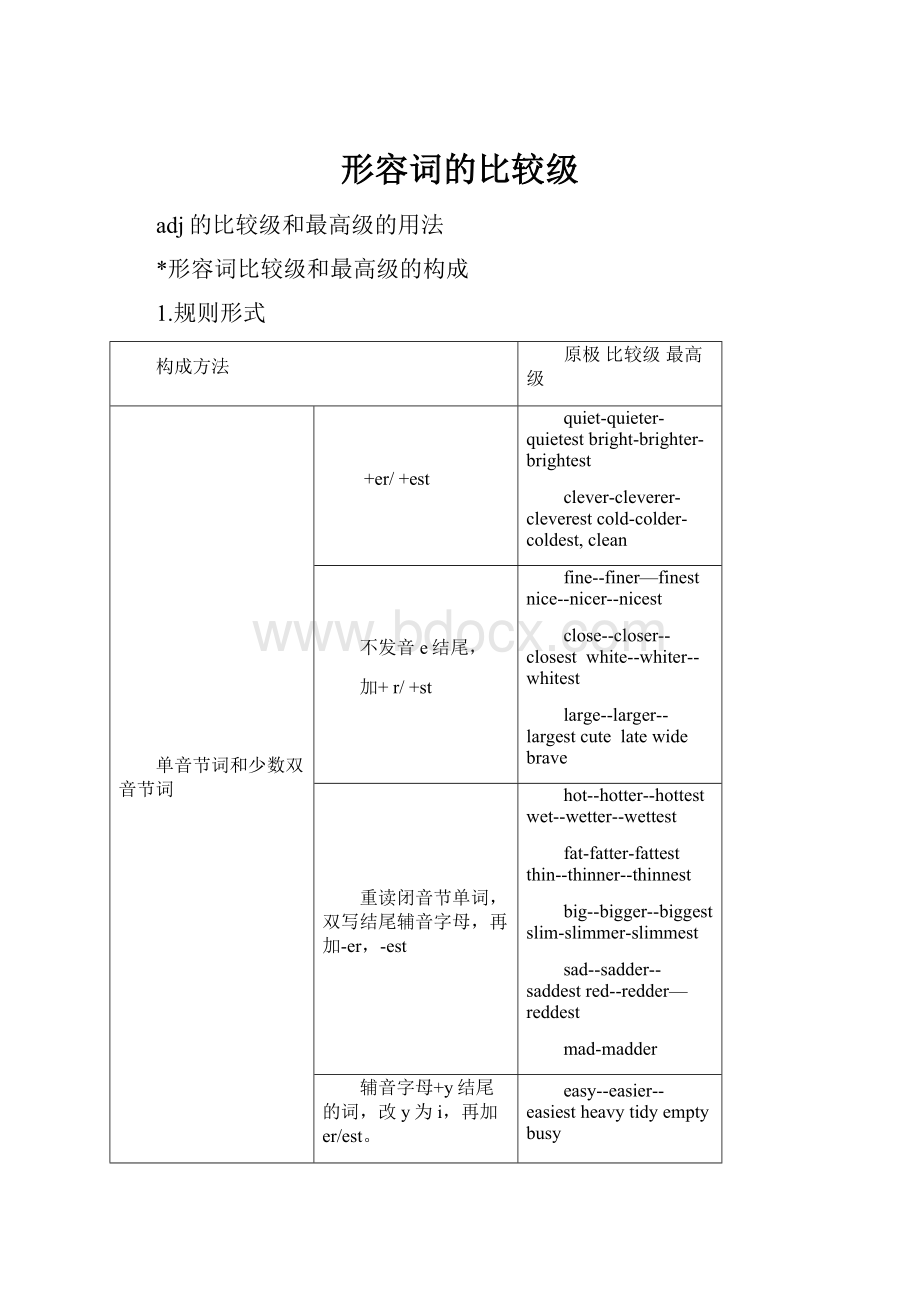形容词的比较级.docx
《形容词的比较级.docx》由会员分享,可在线阅读,更多相关《形容词的比较级.docx(24页珍藏版)》请在冰豆网上搜索。

形容词的比较级
adj的比较级和最高级的用法
*形容词比较级和最高级的构成
1.规则形式
构成方法
原极比较级最高级
单音节词和少数双音节词
+er/+est
quiet-quieter-quietestbright-brighter-brightest
clever-cleverer-cleverestcold-colder-coldest,clean
不发音e结尾,
加+r/+st
fine--finer—finestnice--nicer--nicest
close--closer--closestwhite--whiter--whitest
large--larger--largestcutelatewidebrave
重读闭音节单词,双写结尾辅音字母,再加-er,-est
hot--hotter--hottestwet--wetter--wettest
fat-fatter-fattestthin--thinner--thinnest
big--bigger--biggestslim-slimmer-slimmest
sad--sadder--saddestred--redder—reddest
mad-madder
辅音字母+y结尾的词,改y为i,再加er/est。
easy--easier--easiestheavytidyemptybusy
sunnydrycloudysnowyrainywindytasty
funnyhappyluckyhealthyfriendlyearly,pretty,happylazyearly
多音节词和部分双音节词
词前加more和most.
beautiful-morebeautiful-themostbeautiful
interesting,delicious,careful,exciting,important
necessarydifficult
2.不规则形式
good/well-better-best(两)好bad/badly/ill-worse-worst坏/病
many/much-more-most(两)多little-less-leastfew-fewer-fewest少
farfarther-farthest(距离远)oldolder-oldest(年长的)
远further-furthest(程度深)老elder-eldest(资格老的
*形容词比较级和最高级的用法
1.表示同级比较,用“as+形容词原级+as”;“notas(so)+形容词原级+as”
2.表示两者的比较,用“形容词的比较级+than....”
Therearefewerhoursofsunlightinwinterthaninsummer.HeisslimmerthanI.
Sheplaysping-pongbetterthanI(do).(与主句相同的部分通常省略)
3.表示两者中较/更…的一个,用the+比较级,而且还用ofthetwo,ofthepair短语:
Johnistheclevererofthetwoboys.Ofthetwoboys,Johnisthecleverer.
Thelargeroneofthetwoismyhometown.Ihavetwosons,thefatteroneisMax.
4.比较级前用much,far,alot,abit,alittle,even,still,any来修饰。
表“..得多”,“甚至...”,“...一些”。
”
Thisroomismuchbrighterthanthatone.
I’mspendingalotmoretimeonEnglishthanbefore.
5.倍数的表示,倍数+as+原极+as…
Beijingistentimesasbigasmyhometown.Thisroomistwiceasbigasmine.
6.用“比较级+and+比较级”的结构,译为“越来越…”
Theweatherisgettingcolderandcolder.Thecityisbecomingmoreandmorebeautiful.
7.用“the+比较级,the+比较级”的结构,译为“越…(就)越…=if从句
Thehighertheground,thecoolertheair.Themore,thebetter
Theharderyouwork,themoresuccessfulyouwillbe
8.前后比较对象要一致.
Mynewsismoreexcitingthanyours
TheclimateofKunmingisbetterthanthatofBeijing.(√)
ThepopulationofShanghaiislargerthanthatofTianjin.
比较对象是可数复数...thanthose/theones...
可数单数....thanthat/theone.....不可数名词....thanthat
9.两者之间选择比较,用
Whichis+比较级,AorB?
eg:
Whichisheavier,anelephantorapig?
10.表示两者以上的比较,用“the+形容词最高级....+of(in,among…)...”
或(that)Ihaveeverdone/seen
Thisisthehappiestdayinmylife.Maryisthebestsingerinourclass.
Thisisthemostdifficulthomework(that)Ihaveeverdone.
in+团体/范围/项目。
如inChina,intheworld.,inmyclass,inthecompetition
among/of+参加比较的对象,即个体名词复数形式。
of/amongthem(three)
Ofallthemovies,Ithinkthisistheworst.
Amongthem,ChangshaisthenearestcitytoGuangzhou.
11.the+adj最高级,有my/Tom’s等时,省略the.
hisninth/happiestbirthdayTom’sbestfriend
12.“oneofthe+最高级”表示“最…之一”,形容词后的名词用复数形式。
Mr.Greenisoneofthemostpopularteachersinourschool.
13.The+序数词+最高级:
“第几最.....”
HuangheRiveristhesecondlongestriverinChina.HeisthethirdtallestboyinClassOne.
14.a/an+最高级,表示“非常”的意思
Itisamostimportantquestion.
16.用比较级表示最高级。
同一范围用:
thananyother+n的单数;thantheother+n复数
Heistallerthananyotherstudentinhisclass
Heistallerthantheotherstudentsinhisclass.=Heisthetalleststudentinhisclass.
Heistallthananyoftheotherstudentsin......
不是同一范围时找无other的选项
ShanghaiisbiggerthananyothercityinChina.
ShanghaiisbiggerthananycityinJapan
17.less/least+adj
AislesscarefulthanB------BismorecarefulthanA
AislessexpensivethanB-----AischeaperthanB-----BismoreexpensivethanA.
定语从句
1.定语从句:
在复合句中,修饰某一名词或代词的从句叫做定语从句,被修饰的名词或代词叫做先行词,定语从句一般放在先行词的后面.
e.g:
ChenGuangBiaoisthemanwho/thatraisesmoneytobuildschools.
Weshouldrememberthosedaysthat/whichwespentduringtheOlympicGames.
有时,先行词与从句不是紧挨着。
E.g:
Hesentamessagetomewhichsaidhewasbusy
2.关系词:
引导定语从句的关联词称为...,关系词有关系代词和关系副词。
3.关系代词作用:
①引导从句。
②代替主句中的先行词。
③在定语从句中充当一个句子成分,做宾语时可以省去。
4.关系代词:
that(人/物),which(物),who(人),whom(人,宾格),whose(所有格),as等,没有what;关系代词在从句中作主语,宾语(可以省去),表语,定语等.
Itisaboutamanwho/thatfallsinlovewithawomanwhenhetravelsonaship.
Theplacethat/whichyouwereborninisSanFrancisco.
Thepersonwho/thattookhimabroadwhenyou’reyoungwashisuncle.
Isthepianoyouareplayingboughtatthehighprice?
5.关系副词:
where,when,why等。
在从句中作地点状语where=in/at/on/...which,
时间状语when=during/on/in/...which,原因状语why=forwhich等。
IstillremembertheroomwhereIwasborn.
IhavetomakemarksinplaceswhereIhavequestions.
Doyouremembertheafternoonwhenwemetforthefirsttime?
6.注意点:
1).先行词不能重复thebook.
ThisistherightbookwhichMrLIislookingforit.
2).关系词在从句中做主语时,从句中谓语动词的单复数要视先行词的单复而定。
Ihatepeoplewhotalktoomuchbutdolittle.
Ihatethemanwhotalkstoomuchbutdoeslittle.
Heisoneoftheteenagerswho/thatareinterestedinflying.
7.关系代词用that的情况。
1).先行词是all,much,little,few,anything,everything,nothing,none,theone等不定代词时。
Isthereanything(that)youwanttobuyintheshop?
There’snotmuchthatshouldbedonerightnow.
Ididnothingthathurtyouinthepast.
2).先行词被theonly(唯一),thevery(正是),thelast等adv修饰时。
Afterthefireinhishouse,theoldcaristheonlything(that)heowned.
Cheatingwastheonlythingthatinterestedhermost.
Thisistheverydictionary(that)Iwanttobuy。
GameofDeathwasthelastfilm(that)heactedin.
3).先行词被序数词和最高级修饰时。
Hewasthefirstpersonthatpassedtheexam.
Thisisthebestfilm(that)Ihaveeverseen.
4).以who或which开始的特殊疑问句,为避免重复,只能用that.例如:
Whoisthegirlthatiscrying?
正在哭泣的那个女孩是谁?
5).先行词里同时含有人或物时.
Icanrememberwellthepersonsandsomepictures(that)Isawintheroom.
我能清楚记得我在那个房间所见到的人和一些照片
一.这些动词的现在分词要双写加ing,
1.sit/put/get/forget/hit/let/cut/chat/fit(使)适合;安装;合身/forget,
shut,spit吐痰,set设置,放置,安置.regret,babysit
2.stop,shop,drop,mop,trip绊倒,摔倒,step踩,trap陷入(困境)clap,
slip滑,滑脱
3.swim/begin/run/win/plan/spin
4.travel/quarrel/control/cancel取消,注销;抵消
5.beg/dig/nod/rob
6.refervi.提到;参考,查阅;prefer更喜欢;star主演
二.这些动词的过去式和过去分词是规则的,要双写+ed.
1.chat/fit(使)适合;安装;合身,regret
2.stop,shop,drop,mop,trip绊倒,摔倒,step踩,trap陷入(困境)clap,
slip滑,滑脱
3.plan
4.travel/quarrel/control/cancel
5.beg/nod/rob
6.refervi.提到;参考,查阅;prefer更喜欢;star主演
三.adj的比较级
1.双写+er
wet--wetter--wettestfat-fatter-fattestthin--thinner—thinnest
big--bigger--biggestslim-slimmer-slimmestsad--sadder--saddest
red--redder—reddestmad-madder
2.辅音字母+y结尾的词,改y为i,再加er/est
easy--easier--easiestheavytidyemptybusy
sunnydrycloudysnowyrainywindytasty
funnyhappyluckyhealthywealthyfriendlyearlylovely
一般现在时
1.一般现在时表示经常发生的动作或存在状态,特征,能力,性格。
2.通常与everyday/year/morning/Monday/autumn,always,usually,often,sometimes,attimes,never等连用。
3.句型构成
①be动词:
主语+be(am,is,are)+其它IamanEnglishfootballplayer.
②行为动词:
主语+行为动词(+其它)。
WestudyEnglish.harderthanbefore.Helikesicecream.
4..主语在第三人称单数时用动词的“三单形式”,其他人称用动词原形。
5.动词三单的变化规则:
①一般情况下,直接加-splay—playslike—likes
②以s.x.ch,sh,o结尾,加-es:
misses,passes,mixes,fixes,watches,pushes,wishes,
do--does,go--goes
③以“辅音字母+y”结尾,变y为i,再加-estry---triesstudy---studiescry---criesfly---flies(以“元音字母+y”结尾,直接加-s,buys,enjoys,plays,stays,says,pays)
不规则变化:
be----ishave----has
6.句子转换:
①一般疑问句:
be动词或情态动词(can,could等)提到主语的前面,
当句子中没有be动词或情态动词,在句首用do/does变成问句;原来的行为动词恢复原形
②变否定句:
在be动词或情态动词后面加not;当句子中没有be动词或情态动词时,主语后加助动词don’t,doesn’t形成成否定,原来的行为动词恢复原形
7.人称:
第一人称I,we第二人称:
you,you
第三人称单数:
①人称代词he,she,it②单个人名HanMei、地名Beijing或称呼UncleWang
③单数可数名词adesk或"this/that/the+单数可数名词④不可数名词themilk/bread
⑤不定代词someone,anyone,anybody,somebody,noone,nobody,everyone,everything,something,nothing,anything及指示代词this,that⑥动名词doingmorningexercises,drinkingmilk
⑦特殊疑问词what,who,which
一般过去时
1、定义:
表示过去某个时间发生的动作或存在的状态。
.
2、表示过去的时间,yesterday,thedaybeforeyesterday,lastnight/year/week/Tuesday
/spring,in1990/May,inthe1970s,twodays/amomentago,aftertwohours=twohourslater,thismorning,justnow,onceuponatime,theotherday(几天前),inthepast,usedtodo...(过去常常),at5=attheageof5=whensbwas5.
when,before等引导的时间状语从句等。
3、句型构成
①主语+was/were+.....主语+wasnot(wasn’t)/werenot(weren’t)
Was/Were+主语+......?
②主语+行为动词过去式+.......主语+didnot/didn’t+行为动词原形+......
Did+主语+行为动词原形+......?
特殊疑问词+did+主语+动词原形?
如:
WhatdidJimdoyesterday?
特殊疑问词当主语时:
疑问词+动词过去式?
如:
Whowenttohomeyesterday?
4、动词过去式的构成:
(1)规则动词过去式的构成
①直接加-ed。
如look-looked,play-played,offer-offered,weigh-weighed,
destroy-destroyed,sign-signed.
②以不发音字母e结尾的动词,去e再加-ed。
如like—liked,provide—provided,hate
—hated,live-lived。
③末尾是辅音字母+y结尾的动词,变y为i,加-ed。
如study-studied,fly-flied,
carry-carried,cry---cried元音字母+y”结尾,直接加-ed,stayed,enjoyed,played
④末尾只有一个辅音字母的重读闭音节,先双写这个辅音字母,再加-ed,stop,drop,
trap,shop,mopplan,fit(使适当,安装,合身),travel,prefer,refer,regret,ban,beg,
nod
(2)不规则动词的过去式需特殊记忆
5.注意:
①时态一致的需要用一般过去时。
如:
Ididn’tknowyouwerehere.没想到你在这里。
②表示一系列的动作,尽管有先后,都用一般过去时,最后两个动词之间用and
连结。
如:
Heopenedthedoor,rushedoutandthendisappeared.他打开门,冲了出去,然后就消失了。
Afterhepackedhisschoolbag,hewentout.
③在语境中理解“我刚才/原来还不……”。
如:
—Yourphonenumberagain?
Ididn’tquitecatchit.—It’s2566666.
—Youcan’tsmokehere,lookatthesignonthewall.—Sorry,Ididn’tnoticeit.
现在进行时
1、定义:
表示此时或先阶段正在进行着某种事情
2、时间状语:
now,atthepresent,atthemoment,today,thisweek,thesedays
3、句型构成:
肯定句式:
主语+be(am,is,are)+现在分词+其它.
否定句式:
主语+be(am,is,are)+not+现在分词+其它
Wearewaitingforyou.Theyareplayingbasketball